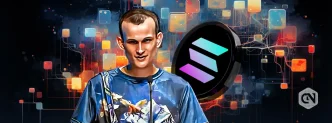Decentralized protocols and blockchain-enabled smart contracts are streamlining the way digital transactions are being conducted globally.
Distributed ledger technology (DLT) has the potential to fundamentally transform many different sectors by eliminating the need for third parties and enabling the automated execution of contract terms and conditions.
This past year has seen the crypto and blockchain sector approach mainstream adoption levels. Decentralized finance (DeFi), a part of the fast-evolving crypto space, has introduced innovative ways to lend, borrow, and even stake digital assets. In early 2019, the DeFi space was valued at well below $500 million, but it has now exploded to reach almost $100 billion. Major decentralized protocols such as Aave (AAVE) and Uniswap (UNI) are now playing a key part in supporting the decentralized economy.
Smart Contacts May Enable Greater Transparency
The DeFi ecosystem is being supported by smart contracts, which help lower overall transaction costs while enhancing the efficiency of business processes. According to industry experts, smart contracts have been effective at significantly lowering counterparty risk. They also enable more transparency because they use blockchain or DLT to conduct transactions without third parties.
Smart contracts can also be used to maintain an accurate, immutable set of records. Additionally, they may be used to settle monetary transactions, carry out clinical trial procedures, and support supply chain and trade finance processes. In certain cases, it’s also beneficial to use smart contracts for real estate transactions and governance, among other applications.
While there are certainly many great use-cases for smart contracts, they can be inefficient to execute in certain scenarios.
Common Issues with Smart Contracts
Smart contracts cannot integrate with external systems, and they can’t export data to other systems. A smart financial contract, for instance, will rely on market information to determine the number of funds each party receives in a transaction.
For this to be properly implemented, it requires relevant documentation and virtual signatures of the parties involved in the transaction. Smart contracts don’t use traditional types of services to access information. They aim to ensure that the requirements of the contractual agreements are fulfilled, but they don’t automatically supply the information or data needed.
Advertisement
In order to address this issue, Oracles have been created to enable smart contracts to integrate with real-world information. They’re able to verify the authenticity of data sets reliably.
These solutions come with their problems as well. By adding Oracles to blockchain or DLT-based transactions, we are compromising one of the main use-cases of blockchains which is to make it possible to perform transactions, all without requiring the involvement of intermediaries.
Oracles are basically intermediaries, and involving them in transfers leads to their influence becoming a risk factor. The validity of the Oracle might become questionable, and this can remove the trustless aspect of blockchains.
QED Embeds and Supports Financial Contracts in a Trustless Manner
Many decentralized platforms and protocols have been focused on creating Oracle services, and the drawbacks of Oracles, as it relates to smart contracts, have been documented. QED is a platform that is focused on addressing these problems.
With QED, every financial contract gets embedded in a trustless and pre-programmed smart contract environment. The underlying protocols may send and receive data without relying on intermediaries to provide sufficient security and decentralization.
In order to promote the use of this ecosystem, Oracles will be given QED tokens and a special incentive to maintain their ownership. Only the highly reliable Oracles may be tasked with managing the protocol, which should help with improving the accuracy of key processes. The primary benefit of QED is that it uses a fully automated process that doesn’t need intermediaries and provides an accurate determination of Oracle dependability.
By supporting sufficient decentralization and ensuring that the parties of a transaction only have to determine the applicable fee to carry out a contract, it helps with ensuring seamless execution of smart contracts.
It’s worth noting that the base software for QED, called DelphiOracle, has become one of the most widely-used Oracles on WAX_io, with over 1400 actions performed on an hourly basis.
DelphiOracle has been in the market for more than 3 years, so it could make it through the different challenges the industry has faced over that period of time. This arguably makes it a robust project backed by experienced team members.
QED Could Have Addressed Issues with Pyth Network Exploit
Notably, there had been a hack on the Pyth network, which is the Solana-powered Oracle protocol. Pyth provides low-latency Oracle price feeds for DeFi. It has been developed to service clients that may want to engage in high-frequency trading. The platform is suitable for quants at the moment.
Advertisement
On September 20, 2021, their BTC/USD aggregate pair went AWOL. It had reportedly been hacked, and the Bitcoin (BTC) price on DeFi platforms like MangoMarkets went as low as $5,500/BTC, which led to a very large number of liquidations. Users basically had no way to recover their funds.
With QED, however, a claim would have been made, and the Resolution Oracles would have accurately determined that the initial Oracle price feeds were erroneous. Meanwhile, collateral bonds would already have been issued to those clients that may have been impacted by the incident.







